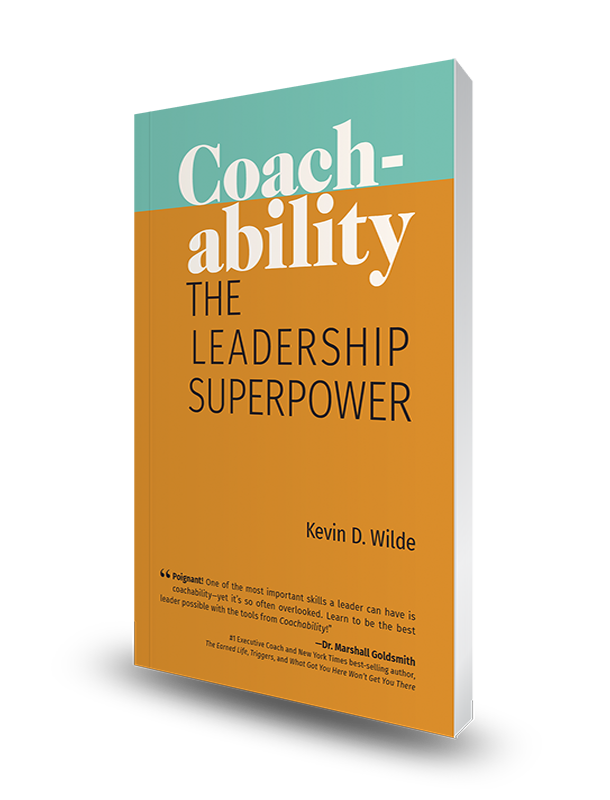Are less likely to experience career derailment due to blind spots
A 2015 study of 93 derailed leaders vs. a general population of 500 leaders at a Fortune 500 global manufacturing company showed that derailed leaders are rated about 30% lower in their interest in seeking and acting upon feedback. Further analysis showed that the derailed leaders had rated their own abilities significantly higher than other raters in 360-degree survey assessments. (1)
This phenomenon of overrating oneself has been found in other research studies of derailed leaders. A similar study of derailed leaders found lack of feedback or inability to hear it as a determining factor in failure. (2)
Have higher overall leadership effectiveness
A study of over 51,000 leaders found a strong correlation between overall leadership effectiveness (as measured by 360-degree survey ratings) and higher levels of coachability. (3)
Highly coachable leaders continue to improve their abilities and impact over time by using feedback and input from others. Higher scores in areas such as influence, inspiration, and innovation indicate coachability as one way a leader can be seen positively by others. Published studies on world-class performers demonstrate the value of feedback as a greater factor in increased abilities over innate talent. (4)
Are you in the learning zone?
Access a free download that will help you stay in the Coachable Learning Zone of high coachability.
Have increased employee engagement
A study of over 45,000 leaders found those rated with greater degree of coachability were also more likely to have more engaged employees. The top 20% of highly coachable leaders had 2.5x greater levels of employee engagement. (5)
Have higher performance and potential ratings
A series of organization studies report that leaders rated as having higher levels of coachability were also more likely to be rated as having greater performance and potential to move into higher levels in the organization. One study of nearly 5,000 leaders found highly coachable leaders’ performance ratings to be 20% greater than bottom performers. (6)
Similar links between performance ratings and coachability were found in other studies measuring the potential to advance. Another study reinforced the link between coachability and value; it found that individuals who proactively seek feedback are more highly regarded by their managers. (7)
Organizations reward the results of highly coachable leaders, and invest in their future growth
- Higher ratings of their abilities
- Higher levels of current performance in their current roles
- The opportunity to take on more demanding leadership roles in the future
An extensive list of research references on the case for coachability are included in my book, “Coachability: The Leadership Superpower.”
Coachability: The Leadership Superpower
—Kevin Oakes, CEO, Institute for Corporate Productivity; bestselling author, Culture Renovation

References
(1) Wilde, K., i4cp 2017 Conference: Kevin Wilde on Studying Success through Failure. Retrieved from YouTube.
(2) Kaplan, R.E., and Kaiser, R.B. (2003). “Developing Versatile Leadership”. MIT Sloan Management Review, 44 (4) 2003. Quast, L. N., Center, B. A., Chung, C., Wohkittel, J. M., & Vue, B. (2011, February). “Using multi-rater feedback to predict managerial career derailment: A model of self-boss rating patterns”. Paper presented at the 2011 Academy of Human Resource Development International Research Conference in the Americas, Chicago, IL.
(3) Zenger Folkman (2017, May 1). Coachability: How Coachable Are Your Leaders? Webinar [Video] YouTube.
(4) Colvin, G. (2010). Talent is Overrated: What Really Separates World-Class Performers from Everyone Else. New York: Penguin Publishing Group. De Stobbeleir, K.E., Ashford, S.J., and Buyens (2011). Feedback seeking behavior is cited as impacting creativity. “Self-Regulation of Creativity at Work: the Role of Feedback-Seeking Behavior in Creative Performance.” The Academy of Management Journal, Vol. 54, No. 4. 811-831). Pinchot III, G.(2018). “INTRAPRENEURING Why you don’t have to leave the corporation to be an entrepreneur.” New York: HarperCollins.
(5) Zenger Folkman (2017, May 1). Coachability: How Coachable Are Your Leaders? Webinar [Video] YouTube.
(6) Zenger Folkman (2017, May 1). Coachability: How Coachable Are Your Leaders? Webinar [Video] YouTube.
(7) Ashford, S.J. and Northcroft, G.B., (1992). “Conveying More (or Less) Than We Realize: The Role of Impression Management in Feedback Seeking.” Organizational Behavior and Human Decision Process, vol. 53.